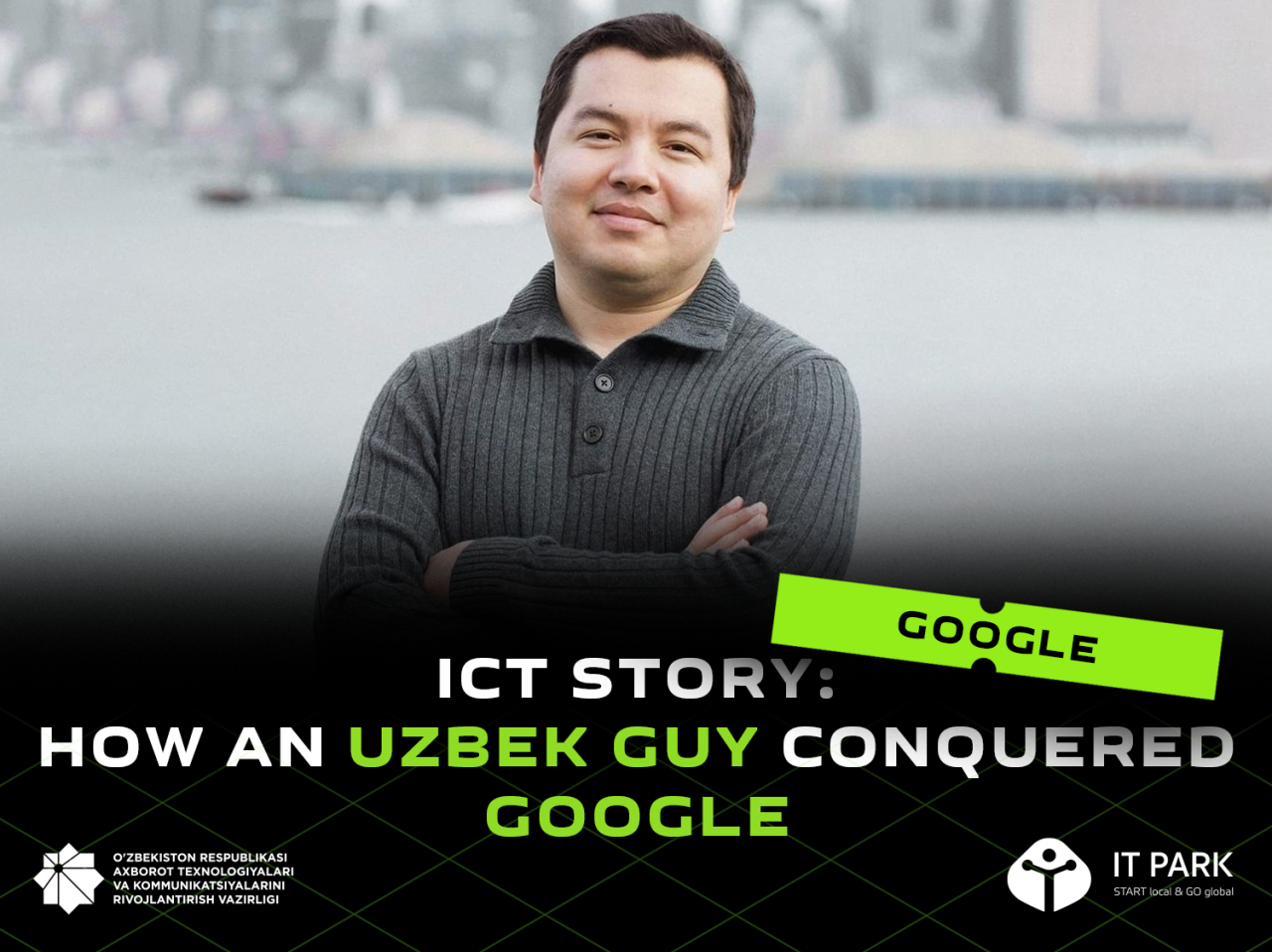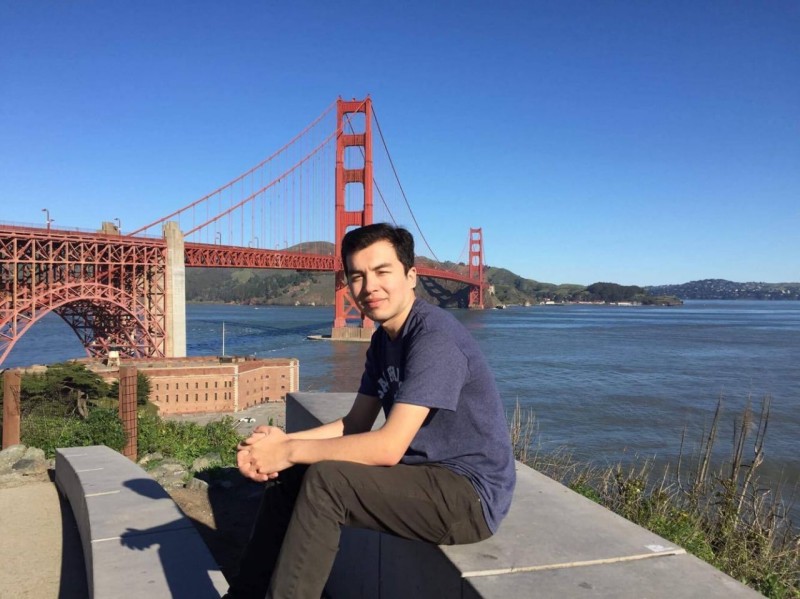
ICT story: how an Uzbek guy conquered Google
IT Park launched a new special edition ICT story, where we share the success stories of Uzbek IT professionals working abroad. Our first guest is Farrukh Khabibullaev.
Farrukh is 29 years old. He studied at the Faculty of Business Information Systems at Westminster International University in Tashkent from 2012 to 2016. After, from 2017 to 2019, he got mathematics and computer science master's degree at the Maharishi University of Management in Iowa, USA.
Farrukh currently works as a software engineer at the Android Automotive OS team at Google. Together with his team, he develops operating systems for cars to make them safer and more interesting for drivers and passengers.
How did you end up abroad?
As Farrukh recalls, he began his career as a senior software engineer at Tune Consulting.
‘I made my first step into the IT setor in my home country at Tune Consulting. Within 2 year, from 2014 to 2016 I have created a software and an Android application for JSC "Uzbekiston Temir Yollari" to sell tickets online. After graduation, I really wanted to try my luck at an international company. Then I decided to send my resume to several US companies, and I was very happy that more than 15 companies invited me for an interview. Moreover, 10 of them offered me a job.’
From a large number of proposals, Farrukh chose Neopeutics, Inc in San Francisco, specializing in bioengineering research in medicine.
‘I was offered such an interesting position where I could work with scientists, bioengineers, and do amazing research. This is truly the most exciting experience of my life.’
Neopeutics, Inc. is looking for cures for various diseases. The scientists and researchers at the company work with algorithms and data on an extremely large scale, the petabyte scale as we speak.
‘While working there as a software engineer, I created the analytics and intelligence software that stores and processes these large datasets. Together with his team, he developed software solutions and algorithms that efficiently, safely and reliably store and process such big data.’
The software created by Farrukh and his colleagues has helped scientists and researchers make research easier, faster, and more accurate.
Why USA?
As Farrukh admits, he had no problems with paperwork and moving, everything turned out easily and quickly.
‘There were no problems with the visa. But getting a job in software development in the US from Uzbekistan was not easy. The interview process was very difficult and long, because I had to compete with other candidates in the US.’
As for the costs, here everything turned out much more successfully. The company took care of it.
‘When I accepted a job offer from Neupeutics, Inc, they took care of all my paperwork, the cost of flight and accommodation. The company did everything for me to come to the USA. I just packed my bags and said farewell to my parents.’
Perhaps the only thing that was not easy was missing Uzbekistan.
‘In the beginning, it was difficult for me. I left my homeland, went far from relatives and friends. Abroad, I always miss my relatives, the village in my city, delicious Uzbek food and much more. But on the other hand, it was interesting to immerse yourself in another world and get to know a culture different from yours.’
When asked why he chose the United States, Farrukh replies ‘I thought of the possibilities above all’.

‘It seems to me that the United States has long become synonymous with the word ‘opportunity,’ especially when it comes to careers. There really are opportunities for professional growth. And another huge plus is that you can work with professionals from different countries.’
He also notes that there are millions of jobs in the US for qualified IT professionals, and most importantly, the salary of software engineers in the US is one of the highest.
‘For instance, there are companies in New York that pay more than a million dollars a year to software engineers with 5 years of experience. In addition, the working atmosphere is very comfortable and the schedule is flexible. The companies provide many perks such as health insurance, free meals any time of the day, the ability to work from anywhere in the US, and more.’
According to Farrukh, San Francisco, California was the perfect choice because the IT environment and culture were better than other cities. But another fact influenced the choice of the city. He really likes the climate of San Francisco, because it is warm there, and this reminds him of his sunny homeland Uzbekistan.
How did you pave the path to success?
After working for more than a year as a software engineer at Neopeutics, Inc, Farrukh left for the startup Zume, Inc, where he created software for robots and cobots.
After that, he worked for Amazon for a while.
‘At Amazon, I worked with over 100 engineers and managers on the Prime Video team. I have developed scalable and reliable web streaming services to support hundreds of millions of Amazon Prime Video subscribers and customers. In addition, he participated in the development of Fire OS and applications in Fire TV devices.’
Now Farrukh is successfully working at Google.
‘Here I work as a software engineer with about 200 engineers overall and 20 engineers on my own Android Automotive OS team. I develop smart software and Android operating system for over 500 vehicle types including BMW, Fords, Chrysler and many more. In my team, we design and build a car version of Android OS. For example, you have a car manufacturing company. If you want to make your cars smarter, you can use the version of Android developed by Google and my team.’
In addition, our hero partially works with a team that develops software for autonomous cars.
According to Farrukh, in order to get a job in these companies, he devoted all his free time to study, studied a lot of mathematics and computer science at the university and on his own. He emphasizes that he achieved everything only thanks to knowledge and hard work.
How do you assess Uzbekistan’s IT sector?
According to Farrukh, the IT sector in Uzbekistan is now developing rapidly and more and more young people are interested in building a career in this sector.
‘The state provides limitless opportunities for students, IT professionals and businesses. New IT universities and bootcamps open every year, and IT businesses are not subject to some taxes. I don't think this can be found in any other country. If this trend continues, in a few years Uzbekistan will become a technological center in Central Asia.’
As Farrukh notes, the IT sector of Uzbekistan is slightly different from the American one. In his opinion, in many countries of Central Asia, information technologies are used mainly for commercial purposes (for example, a platform for selling products, payment systems, etc.) or for automating processes. In the US, technology is firmly integrated not only into business and government, but into science as well.
‘For instance, in astrophysics they are used to detect steroids and observe the universe, in molecular biology to observe cells. I really want the possibilities of information technology to be applied as much as possible in scientific fields in order to make work easier and more efficient.’
When asked if he wants to return to Uzbekistan, Farrukh replies that he does not exclude such a possibility.
‘Now I have plans to get a PhD in computational biology/applied mathematics. After that, I may return to live in Uzbekistan forever.’
What advice would you give to young IT professionals?
Farrukh emphasizes that the most important thing in this life is to find yourself and your passion.
‘I believe that a person should listen to his heart. Before I joined Google, I was invited to work at Facebook to work on the Instagram team, but I turned it down because I have a different area of interest, and these applications are not very interesting to me. I assume that I am from the generation that is not interested in this social network. I am glad that I was able to listen to my heart and find the job that I have a passion for.’
He also recommends that young people should study mathematics, physics, chemistry, biology, or one of them in addition to computer science.
‘In the age of artificial intelligence, you should to know at least math and physics in addition to computer science to be a good software engineer.’

2022-08-10